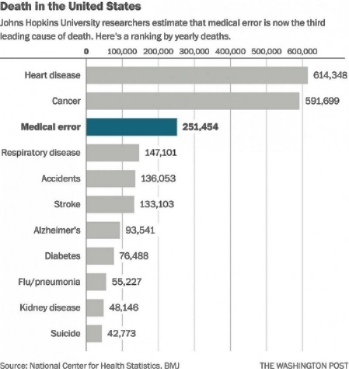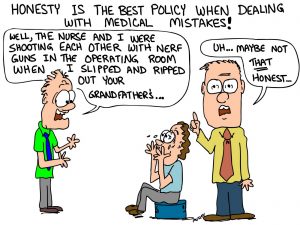New Health blog post – Researchers: Medical errors now third leading cause of death in United States

3 John 1:2 Beloved, I wish above all things that thou mayest prosper and be in health, even as thy soul prospereth.
Go To Health Blog
For anyone first reading the Health and Nutrition Update, please read this first: Your Health.
Also, please go to God’s Health System and subscribe to receive the updates.
Always remember that you are in charge of your health and not the doctors. Do not put your life in their hands without first seeking God and His health system.
Commentary
The goal of this blog is to build up your health and especially the immune system to withstand the coming pestilences that are now rampant in America and the world. God gave us the knowledge to prepare for pestilences, so take advantage of this information.
The focus is posting articles with great information that can immediately help your health and quality of life.
God bless you.
Go To Health Blog

Researchers: Medical errors now third leading cause of death in United States
There are 14 new articles posted, two of which have links and short descriptions below:
Babylonian Health System
 Researchers: Medical errors now third leading cause of death in United States This is what we mean when we refer to the Babylonian health system. It’s why we warn against putting your life and health completely into someone else’s hands, even if that someone is a physician. You need to know as much as you can and make informed decisions because it’s your life on the line.
Researchers: Medical errors now third leading cause of death in United States This is what we mean when we refer to the Babylonian health system. It’s why we warn against putting your life and health completely into someone else’s hands, even if that someone is a physician. You need to know as much as you can and make informed decisions because it’s your life on the line.
“Nightmare stories of nurses giving potent drugs meant for one patient to another and surgeons removing the wrong body parts have dominated recent headlines about medical care. Lest you assume those cases are the exceptions, a new study by patient safety researchers provides some context.
Their analysis, published in the BMJ on Tuesday, shows that “medical errors” in hospitals and other health care facilities are incredibly common and may now be the third leading cause of death in the United States — claiming 251,000 lives every year, more than respiratory disease, accidents, stroke and Alzheimer’s.
Martin Makary, a professor of surgery at the Johns Hopkins University School of Medicine who led the research, said in an interview that the category includes everything from bad doctors to more systemic issues such as communication breakdowns when patients are handed off from one department to another.
“It boils down to people dying from the care that they receive rather than the disease for which they are seeking care,” Makary said.
The issue of patient safety has been a hot topic in recent years, but it wasn’t always that way. In 1999, an Institute of Medicine (IOM) report calling preventable medical errors an “epidemic” shocked the medical establishment and led to significant debate about what could be done.
The IOM, based on one study, estimated deaths because of medical errors as high as 98,000 a year. Makary’s research involves a more comprehensive analysis of four large studies, including ones by the Health and Human Services Department’s Office of the Inspector General and the Agency for Healthcare Research and Quality that took place between 2000 to 2008. His calculation of 251,000 deaths equates to nearly 700 deaths a day — about 9.5 percent of all deaths annually in the United States.”
 Errors With Meds Happen in Half of All Surgeries Once again, see how dangerous it is to rely totally on the Babylonian medical system without doing your part to guard your own health.
Errors With Meds Happen in Half of All Surgeries Once again, see how dangerous it is to rely totally on the Babylonian medical system without doing your part to guard your own health.
“In past studies, doctors rarely self-reported medication errors during surgery. But a new study out of Massachusetts General Hospital, based on researcher observations during 277 procedures in the anesthesiology department, arrived at a far different conclusion: that about half of all surgeries involve a medication error or “adverse” drug event, Bloomberg reports. Coming in Anesthesiology, the study also noted that surgeries lasting more than six hours were found to result in more errors than shorter operations. What’s behind the high rate of surgery drug errors? Seems it’s the hectic nature of OR procedures, which give doctors less time to make checks and balances—unlike drugs administered at other times that get double-checked before the patient takes them.
“In the operating room, things happen very rapidly, and patients’ conditions change quickly, so we don’t have time to go through that whole process, which can take hours,” says anesthesiologist Karen Nanji, one of the study’s lead authors.”
Go to Health Blog




